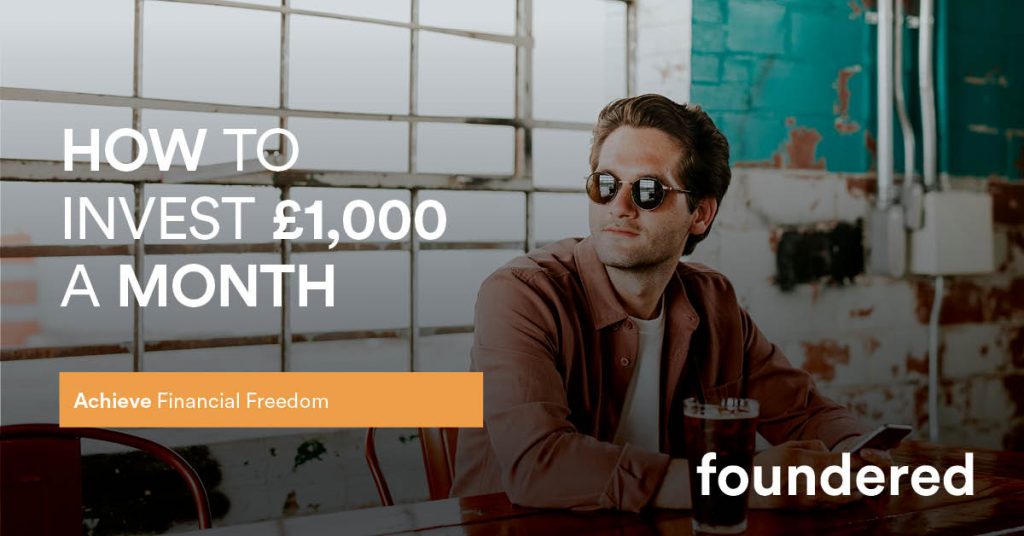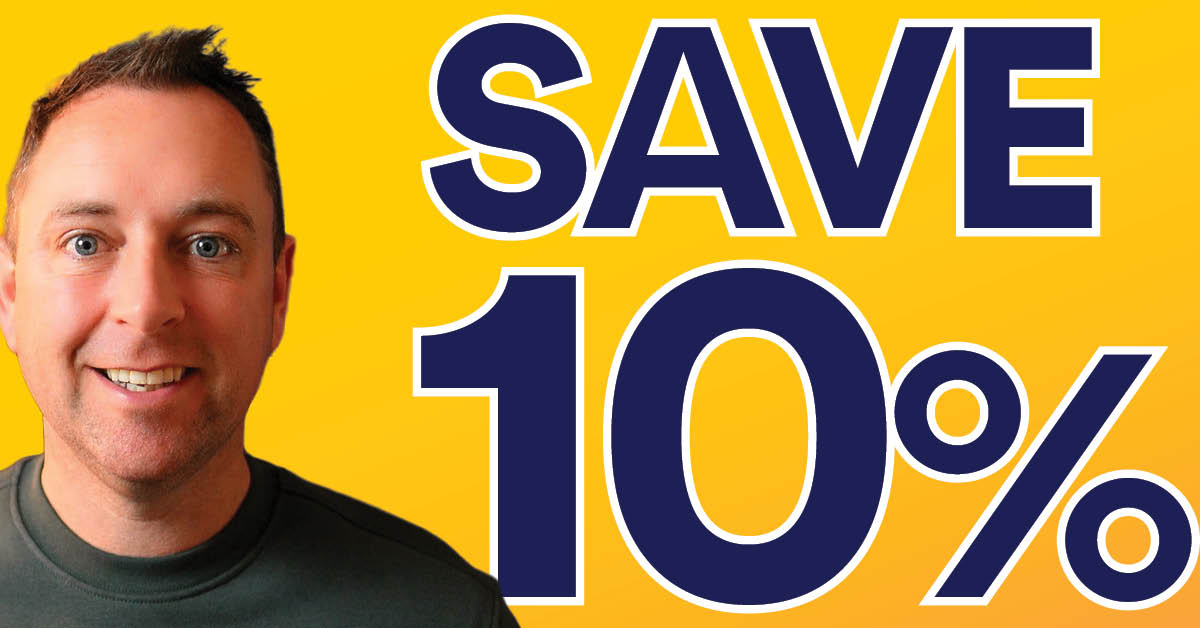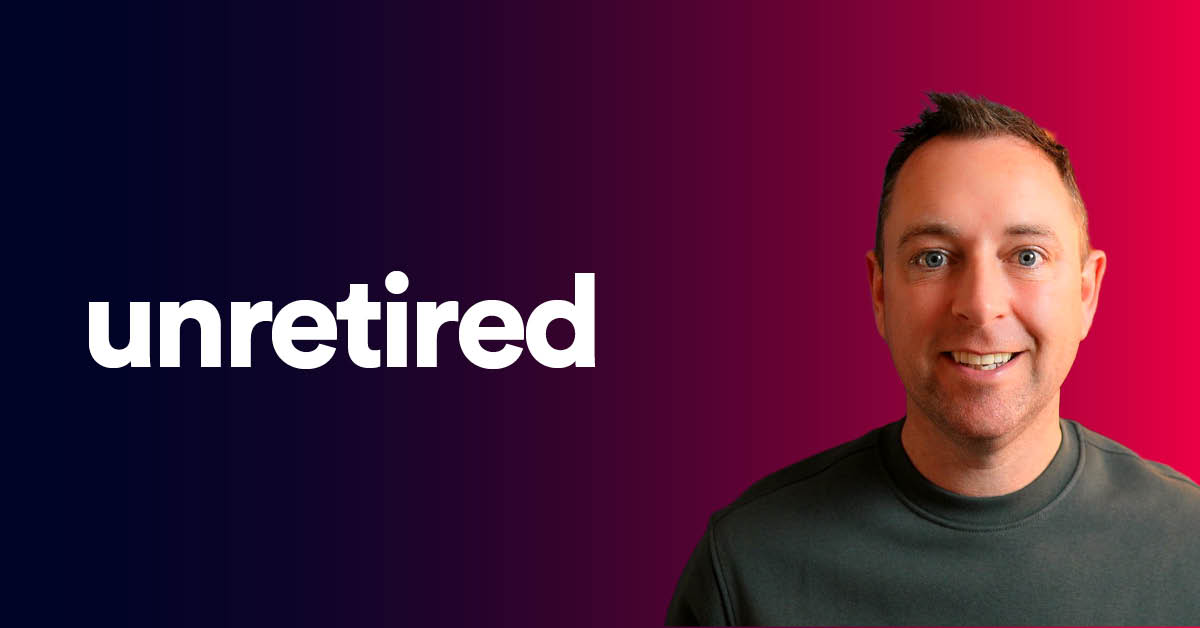If you’re new to the world of investing, it can be daunting at first. You’ve saved hard and now you want to invest. Actually, let’s stop there for a second. CONGRATULATIONS, you’ve saved £1000! You’re on the right path and you’re doing great!
With that said, you’ve come here for a reason! Let’s talk about how you can invest 1000 pounds a month. We’ll focus on the UK for this post, but many of the points are applicable worldwide.
Some of the ideas below will challenge how you think about investing this sum of money and what it can do for you both in the short and longer terms. But I promise you that you’ll thank us for it!
Before we start!
Quantify your goals
Whenever we give consideration to any investment opportunities, it’s always a good tactic to understand what you want from it. Do you want to create an income, provide diversification on other investments, or to develop new skills that will lead to further opportunities? And most importantly, how does this fit into your personal finance plan?
There is no wrong answer here, but always be mindful to consider your expectations from any investment. This will always shape your investing technique.
Risk level
Everyone’s tolerance for risk is different. Many initially think they have an appetite for riskier investments, until they lose money. There are virtually no risk free investments, though we’ll show you how to redefine that later in the article.
Remember investing is not for everyone. Be mindful that any investment value can decrease as well as increase.
Current financial position
Depending on your current financial position, losing £1000 pounds may feel like a lot or a little. Can you afford to lose this money? If not, I suggest you read our budgeting guide first, so that you become better prepared financially before you invest.
Top tip: Before giving consideration to any investments, please make sure you have a 3-6 month emergency fund.
Timeline
How long can you invest your money for? There are no get rich quick schemes with any investments, but leaving your money invested for a longer period usually mitigates any volatility and you may be able to take greater risks.
If you need the money in a short period of time, such as within the next 5 years, be a bit more mindful to the investments you choose.

With all of the above considered now its time to invest. If I had to invest 1000 pounds a month to invest, how could I invest it?
1. Invest £1,000 a month in the stock market
When people think about investing, the stock market is usually what they conjure up in their mind. They are likely thinking of the trading floor on wall street, because thats what movies tell us investing is.
For normal people like you and I, investing in the stock market is unfortunately not just as glamorous. It’s thankfully, also not as crazy. With a smart phone or a laptop you can log on to any investing platform and invest with just a few clicks.
How to invest in the stock market
Where we put our investments is possibly more important than how we invest over the long term. There are three main ways to invest in the stock market. They include: Within your pension. Within a tax sheltered wrapper such as an ISA or LISA and finally a general investment account.
Each of these have their own unique features, that need to be considered before investing.
Workplace Pension
If you avail of a workplace pension (if not, you should), then the simplest way to invest 1000 pounds a month is through salary sacrifice.
Whereby your employer withholds the amount you want to put into your pension and sends this off to the pension provider roughly around the same time you get paid.
Each tax year you can put up to £40,000 into your pension, but remember this also includes your company match, so be careful not to overpay.
Self Invested Personal Pension (SIPP)
You can contribute 100% of your annual income (up to the maximum annual allowance of £40,000) to your SIPP each tax year. Your annual allowance includes personal contributions, employer contributions and tax relief.
Your personal contributions receive a 20% top up from tax relief automatically from your SIPP provider.
The amount of tax relief you receive will match your highest rate of income tax. A higher rate earner can claim back an extra 20% tax relief using their annual self-assessment tax return.
Notes on pensions
- For those born after 6th April 1978, the earliest you’ll be able to access any workplace or personal pension investments will be age 58.
- Your pension contributions may be made before you are taxed. You will usually therefore pay less tax because your tax will be calculated based on a lower amount of UK earnings.
- Pensions grow tax free up to the Lifetime Allowance.
- You usually pay tax if your pension pots are worth more than the lifetime allowance. This is currently £1,073,100.
Individual Savings Account (ISA)
ISA stands for Individual Savings Account. The main benefit of an ISA is you can save, or invest money, without paying income tax on any earned interest, or capital gains tax. In the 2022/2023 tax year, your ISA allowance is £20,000. There are 3 main types of ISAs:
- Cash ISAs,
- Stocks & Shares ISAs and
- Lifetime ISAs.
You can split your ISA allowance across each of these ISAs or solely into one type. You can put a maximum of £4,000 into a Lifetime ISA each tax year. You’re paid a 25% bonus from the government.
General investment accounts
A general investment account is a simple way of investing more money once you’ve reached your annual ISA allowance. Unlike ISAs, there is no limit to how much you can invest in a GIA.
There are no tax benefits for investing in a General Investment Account and you pay income tax and capital gains tax in accordance with your personal tax situation.
Online investment brokers
There are hundreds of online investment brokers across the UK and many have fantastic reputations for choice of investment types, customer service and value.
Below I’ve noted some of the most popular online investment brokers you may want to investigate when choosing to invest 1000 pounds a month.
- Vanguard – https://www.vanguardinvestor.co.uk/
- Interactive Investor – https://www.ii.co.uk/
- Hargreaves Lansdown – https://www.hl.co.uk/
Types of investments
Once we know in how we’re going to invest and within which platform, we need to understand the types of investments available to invest to us.
Stocks or Shares
A stock or share is a type of investment in a company. Companies issue stock shares to raise money in order to finance operational needs and to fuel growth.
Investors buy those stock shares for the opportunity to generate a return on their investment. These returns can come in the form of dividends or in the growth of the value of the shares.
Bonds
A bond is a fixed-income investment that represents a loan made by an investor to a borrower, usually corporate or governmental. The borrower uses the money to fund its operations, and the investor receives interest on the investment.
Funds
Investment funds are created with the sole purpose of gathering investors’ capital, and investing that capital collectively through a portfolio of financial instruments such as stocks, bonds and other securities.
These funds issue new shares as investors add money to the pool, and retire shares as investors sell them.
Want to achieve financial independence?
You could spend the next 13 years learning about personal finance and putting your knowledge into action. Or you could take my FREE 10 day mini course and weekly emails. I’ll show you exactly how to become financially independent. My only question is, whats stopping you?
2. Invest in yourself
Depending where you are financially and physically in life, investing 1000 pounds a month into your own personal development, may provide the best return on investment.
At a class in the Stanford Graduate School of Business, the professor gave everybody $50 and said, whoever can take this money and grow it the most will win. So, various teams went out there and did the following:
Team 1: Purchased as many cheap products as they could for $50, and resold them at a margin. Ended up with $100.
Team 2: Invested the $50 in the market on penny stocks, resulting in little gains.
Team 3: Did nothing with the $50. They came together and discussed each others skills in industry and business. Identified opportunities and sold their expertise as consultants. They made thousands of dollars during the experiment.
Group 3 won. Their own skills, expertise and experience had the greatest opportunity for return and they capitalised on it.
Would you be better investing in yourself, building your own knowledge and skillset to generate a greater return over a longer period?
3. Invest in a business or side hustle
I started my first business with less than £1000. During the time I was the owner, this business returned infinitely more than what I could have achieved in the stock market.
Was it hard work? Absolutely! But investing in my own business is the primary reason I was able to become financially independent.
Recently I posted an article with 94 side hustle ideas. Many of these can be started with no money at all. I’ve also posted some side hustles for graphic designers that wont get you fired
4. Invest in coaching or development
One of my greatest learnings in life was acknowledging that I don’t know, what I don’t know. Paying for coaching or development isn’t a failure but a maturity that shows you’re willing to develop in areas you don’t have knowledge in.
Coaching provides a shortcut in your own journey by capitalising on someone else’s experience. This investment in your future can reap wonderful rewards.
5. Paying down debt
I did say we’d have some advice on how to guarantee success from investing 1000 a month and this right here is that tip. Income is the direct opposite of debt.
While paying down your debt may not feel like income earned from your investment, it guarantees your income will not decrease by the exact interest rate your debt is costing you.
If you were to ask me how to invest 1000 pounds a month in the UK with no risk, I’d start with paying down any high interest debt.
Being debt free affords you a solid foundation to build your investments on. Pay down your debts, create an emergency fund and then think about investing!
Frequently asked questions
There are many ways to invest 1000 pounds a month. The top 5 we have put together include:
- Investing in the stock market
- Investing in yourself
- Investing in a business
- Investing in coaching or development
- Paying down debt
If you have pre-selected your chosen investment, many ISA, SIPP and General investment accounts allow users to invest 1000 pounds a month automatically through a direct debit system.
There are plenty of ways to make money with £1000. You could
- Start a side hustle or business
- Invest in Stocks & Shares
- Spend on coaching
- Invest in learning new skills
- Paying down your debt
Great question! More often we’re being asked how to invest 1000 pounds a month ethically in the UK. Good Money Week raises awareness of sustainable, responsible and ethical finance to help people make good money choices.
Good Money Week happens in October each year and is an initiative by the UKSIF.
Sorry guys! At this time, crypto isn’t something we’ve great experience in. We cannot provide direction on how to invest in crypto. Best of luck though.
Final thoughts on how to invest 1000 pounds a month
When you have the ability to invest 1000 pounds per month, the opportunities presented to you above are interchangeable. One month you may choose to focus on your own personal development. Another may include your side hustle or creating multiple income streams.
However you choose to structure your monthly investments, continuously moving forward and investing is a great habit to continue. It is one of the foundations of achieving financial freedom over the long term.
Let me know how you get on and I look forward to you emailing me with your stories of investing increasingly larger amounts as your skills, expertise and portfolio grows.
Keep in touch
Connor!

